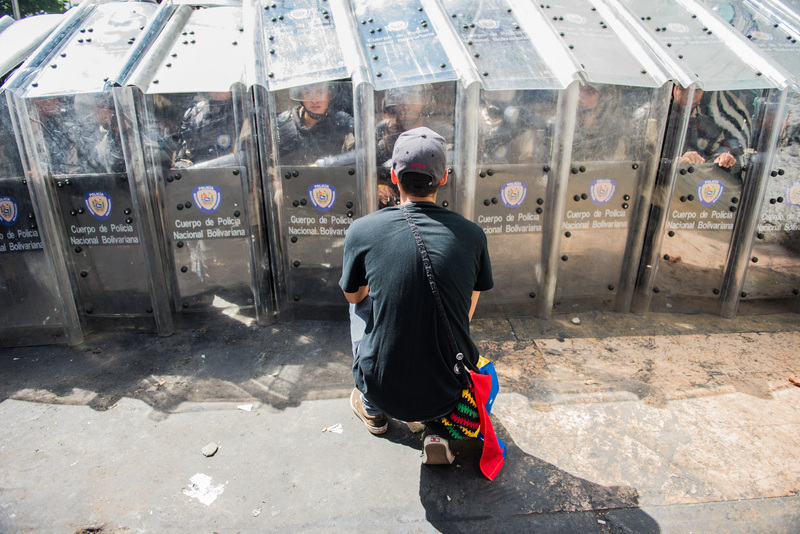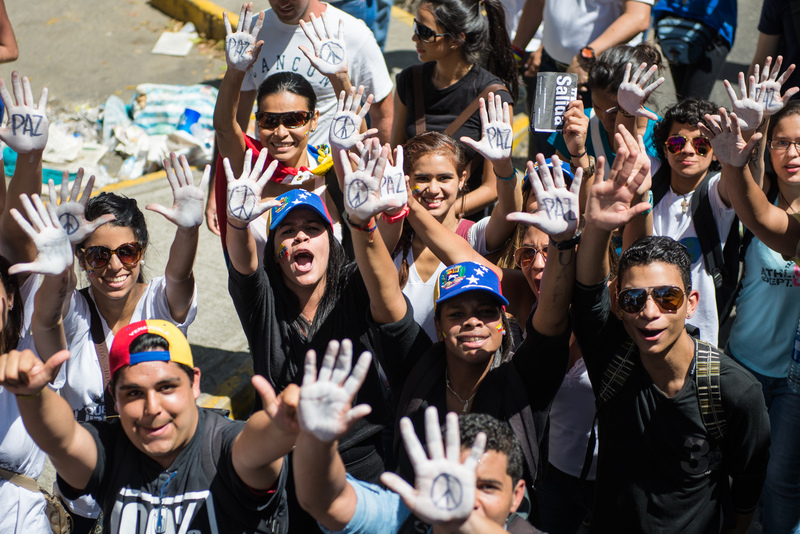
Young man trying to win over police in Caracas on February 12. Photo by Carlos Becerra, copyright Demotix.
[All links lead to Spanish language pages, unless otherwise noted]
Confusion, debate, information exchange, a deluge of photographs and videos—they all overwhelmed the blogosphere and social media in Venezuela following student protests [en] that began in the Andean region and soon spread to other cities throughout the country.
Many videos of police firing on students, interrupting demonstrations and raiding medical centres were published along with photographs of protesters and injured young people.
The response by the government and its supporters has been to indicate their concern over attempts to destabilize the government, and they used Twitter and the hashtag #VzlaUnidaContraElFascismo (“Venezuela united against fascism) to paint demonstrators as agitators trying to thwart Venezuela's revolutionary course.
Many of those who took part in online discussions also pointed out the use of photographs and videos that did not match the dates or events indicated and warned of the danger of Internet rumours running rampant.
In the same way, they accuse opposition leaders of spreading chaos and demand that the forces of law and order be deployed to detain those they consider guilty of provoking clashes in the streets.
Enrique Rojas says:
#VzlaUnidaContraElFascismo ellos siguen en las calles provocando al gobierno, Nosotros Sigamos Trabajando Construyendo esta Patria
— Ramón Enrique Rojas (@Enriquerojas326) February 13, 2014
They continue to provoke the government in the streets, we continue to work building this Nation.
This echoes Caiza Candanga:
El llamado es a los padres de los estudiantes NO PERMITAN QUE SUS HIJ@S SEAN USADOS COMO CARNE DE CAÑÓN #VzlaUnidaContraElFascismo
— Caiza Candanga (@CaizaCandanga) February 13, 2014
The call is for the parents of students to STOP ALLOWING THEIR CHILDREN TO BE USED AS CANON FODDER
As for SClaudia, she questions the motivation of demonstrators:
Venezuela: Protesta o vandalismo? Ataque a la Brigada de Infantería del estado Lara este 12 de febrero por…: http://t.co/BAC4vGyf9T
— claudia (@sclaudia6) February 13, 2014
Venezuela: Protest or vandalism? The State Infantry Brigade in Lara attacked on February 12 by…http://t.co/BAC4vGyf9T
Despite questions from those who support the government, the number of uploaded images only increased during the last several days as protests multiplied in many cities throughout the country.
Miguel Zambrano shares a picture taken by the photojournalist Jorge Silva:
una foto impecable de @jgesilva para una realidad tan sucia pic.twitter.com/4vOQKdnCYC
— Miguel Zambrano (@sinreglaniborra) February 13, 2014
a clear picture by @jgesilva of the harsh reality pic.twitter.com/4vOQKdnCYC
Contradictory information, extreme opinions, and fears expressed by both sides continue to circulate amid hashtags, tweets, and blogs.
From photos to trending topics, it is clear that participation in these new forms of social media is strong. Nevertheless, reading between the lines, it is also apparent that there is a great deal of confusion about the political limitations of the media, unwanted input from criminal elements in the street protests, and the power outages that left some cities in the dark (as reported through the hashtag #sinluz).
To understand how the demonstrations began, the opinion site ProDavinci has published a text dedicated to the origins of the latest clashes:
1. Protestas estudiantiles por la inseguridad: Durante la última semana del mes de enero fueron denunciados diversos episodios de inseguridad en distintas universidades del país. […]
2. La protesta en Táchira: El martes 04 de febrero, una estudiante del núcleo de la Universidad de Los Andes en Táchira se encontraba en el Jardín Botánico […] Para este momento, ya se habían presentado varias protestas en otras ciudades de Venezuela, pero la única protesta reprimida fue la de Táchira.
3. La represión de las protestas: Desde ese martes se registraron distintas protestas en el estado Táchira. Miembros de la Guardia Nacional, la Policía Nacional Bolivariana y la policía regional reprimieron la manifestación apresando a varios estudiantes. […] Horas después, algunos de estos estudiantes dieron declaraciones a medios internacionales para denunciar los sucesos y lo que denominaron un bloqueo informativo de los medios audiovisuales con señal abierta en Venezuela.
1. Students protest lack of security: In the last week of January, students denounced criminal incidents that took place in different universities. [….]
2. Protest in Tachira: On Tuesday, February 4, a student from the University of the Andes at Tachira was the victim of an attempted assault in the Botanical Gardens […] At this point various protests had taken place in other cities in Venezuela, but the only one that was suppressed was on the Tachira campus.
3. Suppression of the protests: Since that Tuesday, several protests were held in the state of Tachira. Members of the National Guard, the Bolivarian State Police [Venezuela's national police force] and the regional police quelled a demonstration and arrested several students. […] Hours later, some of these students gave statements to the international media to denounce the events and what they called an information blackout of broadcast media in Venezuela.
The blog post continues, mentioning both the arrest and transfer of the students to the city of Coro and the addition of other universities to the protest movement.
The author of the blog Cuando era Feliz e Indocumentada comments on the increase in violent rhetoric among the different groups.
La semana pasada fui a un foro académico sobre economía. El chiste en la puerta de entrada, cuando le entregaban un panfleto a todos los asistentes era, “a la salida reclama un fusil”. Me dejó de sonar a broma cuando hubo oportunidad de hacer preguntas a los panelistas y un señor dijo que era necesario hacer una nueva revolución armada. Y en vez de chiflarlo, muchos en el recinto lo aplaudieron.
Last week I attended an academic forum on economics. The joke at the entrances when they handed a flyer to all the participants was to “ask for a rifle at the exit.” It sounded less like a joke during question period when one man said to the panelists that what was needed was a new armed revolution. And instead of booing him, many in the room applauded.
And she continues with a criticism of the limits on access to information:
Al interior de ambos bandos hay divisiones y pareciera que, tanto entre chavistas como entre opositores, las que están haciendo más ruido últimamente son las de los radicales. No hay cómo saber hasta qué punto estas fracturas pueden terminar atentando contra el gobierno. No hay información y no hay como acceder a ella. Intentamos interpretar correctamente las declaraciones, tratamos de buscar otras apreciaciones. Pero cada vez hay menos periodismo, menos reportería, menos datos. Y cada vez hay más propaganda, más opinión, más especulación. Quizás son los ingredientes perfectos para que ahora sí “pase algo”.
There is division within the ranks on both sides, and it would seem that among Chavistas and the opposition alike, those making the most noise recently are the radicals. It is impossible to know just how far these factions can go in their attacks on the government. There is no information and no way to access it. We try to correctly interpret statements, to make objective assessments. But there is less and less journalism, less reporting, fewer facts. Instead there is more propaganda, opinion, and speculation. Maybe these are the right ingredients for “something to happen.”
Writing at Panfleto Negro, John Manuel Silva takes a broad and critical look at the related elements that lie behind the protests, the government's response, and the strategy of opposition groups:
Hablemos claro: el gobierno ha hecho lo que ha querido y lo hubiese hecho independientemente de la actitud opositora. El apropiamiento de PDVSA, las expropiaciones, las leyes que han minado nuestros derechos civiles, la represión, los abusos y la instauración paulatina de una economía socialista ocurrieron porque eran parte del plan del gobierno […]
Hablemos de las calles: si algo quedó claro ayer con esa insólita y despreciable arremetida de los “colectivos” oficialistas, es que la represión de las protestas no se dará por vía tradicional, con la G.N. o la Policía, sino que serán estos grupos paramilitares y parapoliciales quienes harán el trabajo sucio. […]
El gran problema del chavismo no es la forma en que han administrado al Estado; ese es un problema. Pero lo realmente preocupante es como han creado un Para-Estado, tanto a nivel administrativo […] como también a nivel policial y militar
Let's be clear: the government has done what it wanted and it did it without consulting the opposition. The seizing of the PDVSA [state-owned oil and natural gas company], expropriations, laws that undermine our civil liberties, repression, abuse and the gradual establishment of a socialist economy occurred because they were part of the government's plan […]
Let's talk about the streets: if anything was made clear yesterday with this unbelievable and despicable attack by the “official groups” [pro-Maduro], it is that stamping out protests will no longer be done in the traditional way, with the National Guard or the Police, but with those paramilitary and para-police groups doing the dirty work. […]
The big problem with Chavismo is not the way in which it manages the State; that is one problem. But the really worrisome part is how it has created a para-state at the administrative level […] as well as at the police and military level.
In the same way, the author invites opponents of the government to reflect on the political discord:
¿Alguna vez te has preguntado cómo es posible que exista escasez, desempleo, pobreza y una delincuencia desatada y aún así haya gente que apoye al gobierno? ¿Has escuchado la consigna “con hambre y desempleo con Chávez me resteo”? Bueno, si no entiendes ese nivel de indignidad, tal vez debas pensar que negar la existencia de esa otra mitad del país sólo puede llevar a que esas actitudes se extiendan más y más.
Have you ever asked yourself how it can be possible to have such scarcity, unemployment, poverty and unbridled crime and even so there are still people who support the government? Have you heard the slogan, “with hunger and unemployment, what have I got to loose with Chavez?” So, if you don't understand this level of indignity, maybe you should think about how denying the existence of the other half of the country can only contribute to an increase in this kind of attitude.
And finally, regarding those students so opposed to the government that they died violently in the demonstrations, the author concludes:
…los venezolanos no se impactarán por una o dos muertes producto de la represión policial. Más bien hoy, el presidente se encadenará, dirá que los muertos son culpa de la oposición, se victimizará, etc. Y en unos días, todo será olvidado. Los únicos que recordarán siempre a ese estudiante muerto hoy serán sus familiares, mientras que el “miembro del colectivo” también muerto hoy, será exaltado a la condición de héroe y servirá para seguir justificando peores actos de represión.
Venezuelans won't be bothered by a couple of deaths at the hands of the police. Instead today the President will double down, saying the deaths were the fault of the opposition; making himself the victim, etc. And in a few days, all will be forgotten. The only ones who will always remember the student who died today will be his family; meanwhile the member of the “official group,” also dead today, will be hailed as a hero, serving to justify even worse acts of repression.








1 comment